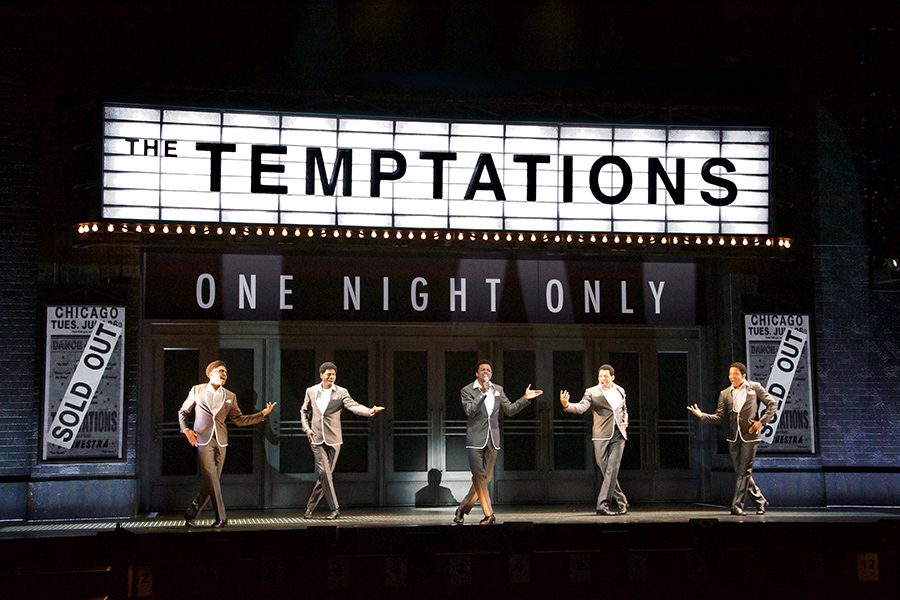One thing you can say about Harold Wheeler: he plays the piano.
That’s a singular thing about a very singular man. But what Wheeler — who at various times is described as a musician, a composer, a conductor and an orchestrator — is surely not is somebody who does just one thing.
These days, he’s a critical part of “Ain’t Too Proud,” a show about the life and times and tunes of the Temptations, the great Motown group that released a string of hits over its turbulent, decades-long history. The show, in the Kennedy Center Eisenhower Theater, runs through July 22.
A big hit where it originated at the Berkeley Repertory Theatre in California, “Ain’t Too Proud” is the handiwork of prize-winning playwright Dominique Morisseau (“Detroit ’67”), choreographer Sergio Trujillo (“Memphis, the Musical”) and Tony-Award winning director Des McAnuff, who staged “Jersey Boys,” one of the top examples of the musical bio-jukebox genre.
And there’s Harold Wheeler, the music man, who’s credited with the catch-all, all-encompassing task of orchestration. With Wheeler, as in life, there’s music … and then there’s music.
“The thing with what I do in terms of orchestration is to bring things together and create a unified feel and sound, everybody working together to make a musical success,” he said.
With the music of the Temptations, there is the temptation to replicate the sound, moves and look of the group which Billboard Magazine once dubbed “the greatest R&B group of all time.” After all, when you hear the first few notes and the first few words of “My Girl,” “Just My Imagination” or “The Way You Do the Things You Do” — or see the group’s precise spin-and-turn moves — almost anyone left alive with a memory of the Motown era is lifted into another time and place.
The “classic five” Temptations lineup was: tenors Eddie Kendricks and David Ruffin, baritones Otis and Paul Williams and bass Melvin Franklin. There have been any number of Temptations since, not to mention the cast of the show.
“It’s a cooperative effort,” Wheeler said. “Certainly, they are unique in the history of popular music, with a distinct sound, but the work is also fresh, and human. It’s a story of their struggles, as well as the music and their success.
“I like to look at the book,” he said. “That’s the first thing that appealed to me. It’s a fantastic story, so right there that got me. Plus being able to work with such a great group of artists. I’ve worked with Des before, and I know everybody. Orchestration is about working with other artists. It always is, no matter what the venue or genre.”
And Wheeler, more than most artists, knows what that means. But maybe that was inevitable in the first place, considering his origins and the totality of his life. You might say he couldn’t help becoming who he is, being pulled toward music, all kinds of music. Born in St. Louis, as a youngster he was a member of Antioch Baptist Church, where the congregation included Ike and Tina Turner and rock ‘n’ roll prophet Chuck Berry.
He went to Howard University, where he encountered Roberta Flack, Stokely Carmichael, Donny Hathaway and, most important and permanent, his future wife, Hattie Winston.
After a stint as a program manager at a New York radio station, he started composing his own music, then got hired by pop meteor Burt Bacharach to conduct for his musical “Promises, Promises,” making him the youngest conductor on Broadway. He was soon working with, composing dance music for and joining the great Broadway showman Michael Bennett, working on classics such as “A Chorus Line” and “Dreamgirls,” another showbiz saga, about a group strongly resembling the Supremes.
Music, he said, is key in everything. That includes managing, directing and conducting for awards shows like the Oscars, twice, and “Dancing with the Stars” for many years until his recent departure. In addition, he worked on solo projects with artists as diverse as Nina Simone and Bruce Springsteen.
“You have to apply different skill sets to different projects,” he said. “It’s not always easy, but there’s nothing like it either. It’s live, and anything can happen.”
Wheeler said: “In some ways, Nina Simone was one of the most challenging people I’ve worked with, but she’s also one of the most unique, gifted and original artists I’ve ever encountered.”
There’s music … and then there’s music.


